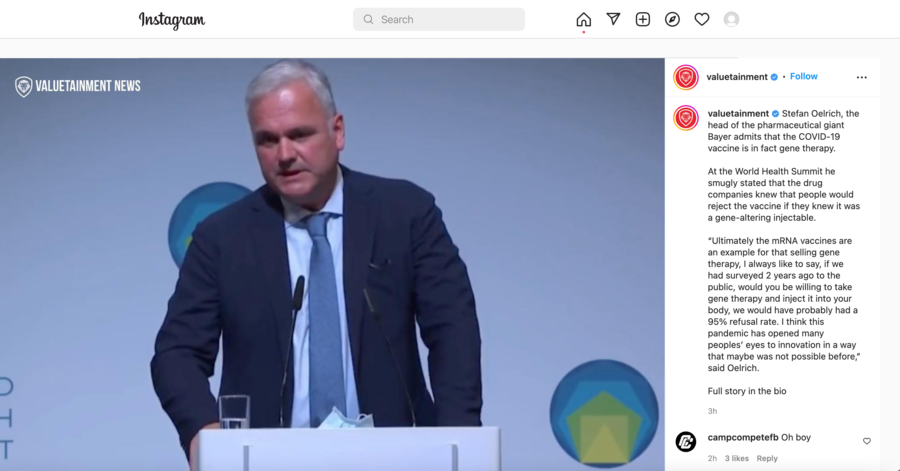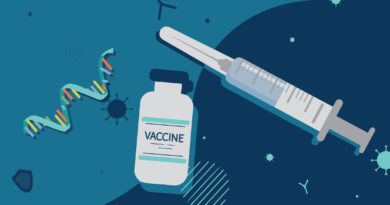Fact Check: Bayer Top Exec Did NOT Admit COVID-19 Vaccine Is Gene Therapy

Did the head of Bayer’s pharmaceutical division admit the COVID-19 vaccines are gene therapy? No, that’s not true: The comments made by Bayer’s Stephan Oelrich were taken out of context. Speaking about innovation in the pharmaceutical industry, he said the COVID vaccines were an example of technological innovations that are paving the way for the public to trust future new innovations like cell and gene therapy. He did not say that the mRNA vaccines are cell and gene therapies. They are not gene therapy and do not modify DNA.
The claim appeared in an Instagram post on June 21, 2022, under the title “mRNA Vaccine Exposed! Bayer Admits COVID-19 Vaccine is Gene Therapy.” It opens:
Stefan Oelrich, the head of the pharmaceutical giant Bayer admits that the COVID-19 vaccine is in fact gene therapy.
This is what the post looked like on Instagram at the time of writing:
(Source: Instagram screenshot taken on Wed Jun 22 20:42:15 UTC)
The post used a photo of Stefan Oerlich, member of the board of management of Bayer AG and head of the Pharmaceuticals Division. He spoke at the opening of the 2021 World Health Summit held in Berlin on October 24, 2021.
Oelrich was discussing innovations in the industry and how public trust embraced these innovations. He mentioned gene therapy to make a parallel construction with COVID vaccines as an example of innovation and how public opinion about new technologies is changing. His quote in the post is taken out of context of his full remarks.
Beginning at 6:34 in a video of Oelrich’s full speech, he says:
We’ve heard a lot about innovation tonight. Health for all is certainly also embedding innovation into all facets of the life sciences ecosystem. Making use of the current momentum to tackle issues beyond COVID-19. We’ve seen the vaccines as the perfect example during this crisis, but innovations in the field of biotech also radically upend our view on many other diseases, especially NCDs [noncommunicable diseases]. We can now think of curing many of those disease not just treating symptoms as we think forward. Innovation … is also sustainability at a totally different level because those that take the leap to drive innovation in a really meaningful way and invest and take the risk to invest in R&D will also attain sustainability by creating job security and creating prosperity for those that take the investment. I think this is really important also for these latitudes here. And for us therefore we’re really taking that leap, us as a company, Bayer, in the cell or gene therapy which to me as one of these examples where really we’re going to make a difference hopefully moving forward.
At 8:01 in the video, he makes the comment used in the Instagram post:
Ultimately the mRNA vaccines are an example for that cell or gene therapy. I always like to say, if we had surveyed two years ago in the public, ‘Would you be willing to take gene or cell therapy and inject it into your body?’ we would’ve probably had a 95 percent refusal rate. I think this pandemic is also opened many people’s eyes to innovation in the way that was maybe not possible before.
Lead Stories reached out to Bayer for comment on the claim. Oliver Renner, head of communications for pharmaceuticals, emailed Lead Stories on June 22, 2022, and said, “According to Bayer, mRNA is not a gene therapy in the sense of general understanding.”
Lead Stories has previously debunked several claims that mRNA COVID vaccines modify DNA, including here, here and here. A resource from the Centers for Disease Control and Prevention (CDC) titled “Understanding mRNA COVID-19 Vaccines” states:
mRNA from these vaccines do not enter the nucleus of the cell where our DNA (genetic material) is located, so it cannot change or influence our genes.
The National Human Genome Research Institute describes mRNA as:
… a type of single-stranded RNA involved in protein synthesis … The role of mRNA is to carry protein information from the DNA in a cell’s nucleus to the cell’s cytoplasm (watery interior), where the protein-making machinery reads the mRNA sequence and translates each three-base codon into its corresponding amino acid in a growing protein chain.



